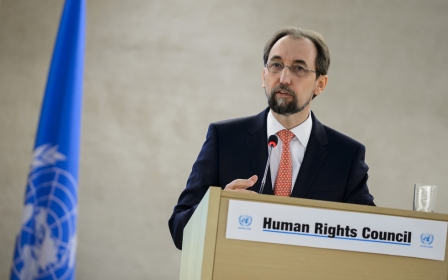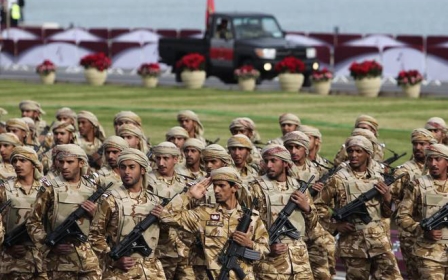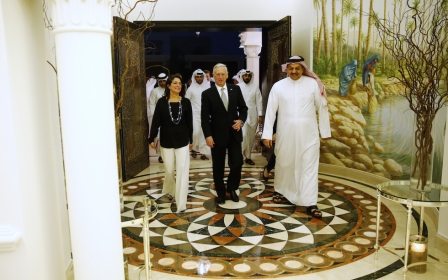Turkey foreign minister in Qatar in push to resolve Gulf crisis
Turkey's foreign minister held talks with Qatar's emir on Wednesday as the search for a diplomatic solution to the Gulf crisis intensified and the UN voiced fears over growing humanitarian issues in the region.
Mevlut Cavusoglu called for dialogue to end the crisis, after meeting Qatar's Emir Sheikh Tamim bin Hamad al-Thani in Doha.
"The meeting discussed developments of the Gulf crisis and means of solving it, in addition to reviewing the strategic ties between the two countries and aspects of developing them on all fronts," a statement from the Qatar News Agency said.
The reference to "all fronts" could refer to Turkey's military base in Qatar.
Saudi Arabia, Egypt, the United Arab Emirates and Bahrain have broken off ties and imposed sanctions on Qatar, accusing it of supporting terrorism and courting regional rival Iran - allegations Doha denies.
"We do not want any differences between our brothers in the GCC (Gulf Cooperation Council) countries, and it is not enough to say that there is a problem without trying to resolve it," Cavusoglu told the Qatari news agency QNA on arrival.
"Turkey seeks to resolve the unprecedented crisis between brotherly countries in the GCC."
Turkey's state-run Anadolu news agency said Cavusoglu would travel on Thursday to Kuwait - which is also seeking to solve the crisis - before moving on to hold talks with King Salman of Saudi Arabia on Friday.
Ankara is one of Qatar's strongest allies and earlier this week committed to deploying troops at its base in the Gulf kingdom.
It is becoming clear that the measures being adopted are overly broad in scope and implementation
- Zeid Raad al-Hussein, UN human rights chief
"Saudi Arabia has the potential and capability to solve this crisis as a wise state and big brother of the region and also as a major actor," Turkey's presidential spokesman Ibrahim Kalin said.
"We aim to involve all actors in this process."
The diplomatic push continued elsewhere, with Turkish President Recep Tayyip Erdogan - who has described the decision by Gulf states to cut political and economic ties with Qatar as "inhumane" - expected to hold phone talks with US President Donald Trump in the coming days.
Erdogan's spokesman said a trilateral meeting between Ankara, Paris and Doha is also planned.
This is in addition to mediation efforts already underway by Kuwait's ruler, Sheikh Sabah al-Khaled al-Sabah.
Calls for dialogue
Meanwhile, the United Nations' secretary general urged the Gulf countries to find a peaceful solution to the row.
Antonio Guterres expressed his "full support for Kuwait's efforts to de-escalate tensions and promote an effective dialogue," a spokesman said.
The planned talks follow Tuesday's discussions between Saudi Foreign Minister Adel al-Jubeir and US Secretary of State Rex Tillerson.
Doha also announced that its navy will take part in a joint exercise with US vessels, which arrived in Qatar on Wednesday.
Qatar hosts the biggest US military base in the Middle East with 11,000 troops deployed to or assigned to al-Udeid Air Base. More than 100 aircraft operate from there.
The Pentagon last week renewed praise of Qatar for hosting a vital US air base and for its "enduring commitment to regional security," after four Arab countries cut ties with the Gulf ally.
'Heartbreak and fear'
In Geneva, concern surrounding the humanitarian situation grew on Wednesday, with the intervention of the UN human rights chief.
"I am alarmed about the possible impact on many people's human rights in the wake of the decision by Saudi Arabia, the United Arab Emirates, Egypt and Bahrain to cut diplomatic and economic ties with Qatar," said Zeid Raad al-Hussein, in his first comments on the crisis.
"It is becoming clear that the measures being adopted are overly broad in scope and implementation," he added.
Amnesty International has warned of "heartbreak and fear" being suffered by ordinary people in the region and accused Saudi Arabia and its allies of "toying with the lives of thousands of Gulf residents".
Bahrain and the UAE have also banned expressions of sympathy for Qatar.
There have also been fears of food shortages in Qatar - so far not realised - and a disruption of imports needed for a number of capital projects in the gas-rich emirate.
Qatar is receiving food deliveries from Turkey, Iran and Morocco, among others.
On Wednesday, the transport ministry in Doha said on Twitter it had launched a new shipping line to transport goods directly between Qatar and India.
The 2022 World Cup host is also in the middle of building huge capital projects worth more than $200bn, many of which rely on suppliers in the region.
Aviation concerns
Doha-based Qatar Airways has been banned from using the airspace of neighbouring countries since measures were announced on 5 June.
However, the carrier said services were largely unaffected by the decision.
The United Nations aviation agency said on Wednesday it was reviewing a request from Qatar to intervene in the crisis.
The International Civil Aviation Organization, a UN agency that regulates international air travel under the Chicago Convention, said it would host talks of ministers and senior officials from Qatar, the UAE, Saudi Arabia, Bahrain and Egypt at its Montreal headquarters on Thursday to seek a "consensus-based solution" that addressed "current regional concerns".
"ICAO is presently reviewing requests from the government of Qatar to assess the flight restrictions imposed upon it by neighbouring states," the ICAO said in a statement. "We are working to bring these states together towards a solution which satisfies both their current regional concerns, and the global needs and expectations of passengers and shippers," it said.
New MEE newsletter: Jerusalem Dispatch
Sign up to get the latest insights and analysis on Israel-Palestine, alongside Turkey Unpacked and other MEE newsletters
Middle East Eye delivers independent and unrivalled coverage and analysis of the Middle East, North Africa and beyond. To learn more about republishing this content and the associated fees, please fill out this form. More about MEE can be found here.




